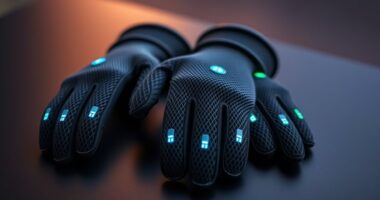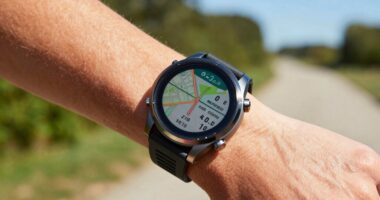If you’re looking for the 13 best personal cloud servers for secure and easy data access in 2025, I recommend options like the Buffalo LinkStation with built-in RAID for security, the UGREEN NASync models for performance and expandability, and Synology’s diskless units for privacy control. Devices like Beelink’s mini PC or gigastone SSD drives enhance speed and storage. Keep in mind compatibility, security features, and expandability. Exploring these options more closely can help you find the perfect fit for your needs.
Key Takeaways
- Prioritize devices offering robust security features like SSL encryption, private ownership, and multi-platform access for optimal data protection.
- Choose NAS solutions with high-capacity, scalable storage, and RAID support to ensure reliable, expandable data management.
- Opt for user-friendly setups with seamless cross-platform compatibility, remote access, and automated backup features.
- Consider performance attributes such as fast data transfer rates, dual network ports, and hardware specifications suited for media and backup tasks.
- Evaluate cost-effective options balancing performance, security, expandability, and long-term support for personal and small business use.
BUFFALO LinkStation SoHo 220 2-Bay Personal Cloud NAS with 4TB (2x2TB) Hard Drives

Are you looking for a reliable, secure, and easy-to-use personal cloud solution for your small office or home setup? The BUFFALO LinkStation SoHo 220 2-Bay NAS fits the bill perfectly. It offers 4TB of storage with two drives, supporting RAID 1 for automatic backups or RAID 0 for full capacity. With fast Ethernet connectivity and compatibility with Windows and macOS, it makes sharing and backing up files straightforward. Its built-in SSL encryption and closed system guarantee your data stays protected. Plus, you can access your files remotely without extra charges, making it a convenient, secure, and efficient choice for personal cloud storage.
Best For: small office or home users seeking a secure, easy-to-use personal cloud storage solution with automated backup and remote access capabilities.
Pros:
- Supports RAID 1 for automatic backup and data security
- Compatible with Windows and macOS for versatile device integration
- Built-in SSL encryption and a closed system enhance data security
Cons:
- Limited to 4TB storage capacity, which may not suit large data needs
- Requires wired Ethernet connection, lacking Wi-Fi functionality
- Mechanical drives operate at 5400 RPM, which may result in slower data transfer compared to higher RPM drives
Smart Personal Cloud Storage Device with 512GB SSD and USB Compatibility
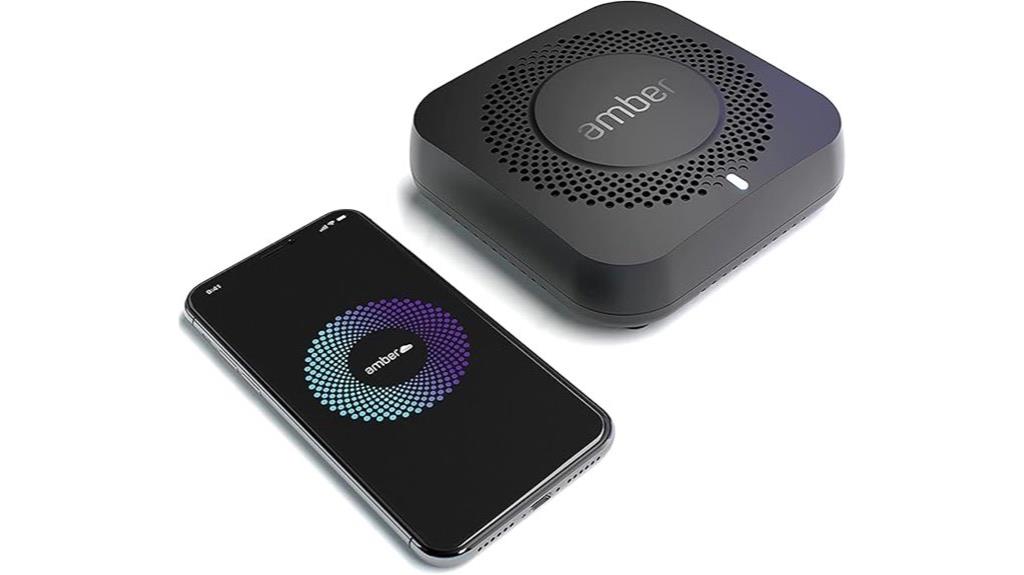
If you want a reliable, private storage solution that offers quick access and seamless compatibility, the Smart Personal Cloud Storage Device with 512GB SSD is an excellent choice. It features a high-speed SSD, ensuring fast data transfer via USB 3.0, and supports iOS, Android, Windows, Mac, Plex, and Home Assistant. Setting it up is simple, and it provides complete control over your data without memberships. Plus, it offers expandable storage through its USB port, making it perfect for media files and backups. With built-in security and easy access from multiple devices, this device combines convenience, privacy, and versatility for personal cloud needs.
Best For: individuals seeking a private, high-speed, and versatile personal cloud storage solution compatible with multiple devices and easy to set up.
Pros:
- Fast data transfer with built-in 512GB high-speed SSD via USB 3.0
- Supports a wide range of platforms including iOS, Android, Windows, Mac, Plex, and Home Assistant
- Complete data ownership and control without membership requirements
Cons:
- Limited to 512GB internal storage, which may require additional USB expansion for larger media libraries
- Slightly higher price point compared to traditional external drives or basic NAS devices
- Requires physical connection for access, lacking built-in Wi-Fi connectivity
UGREEN NASync DXP2800 2-Bay Desktop NAS
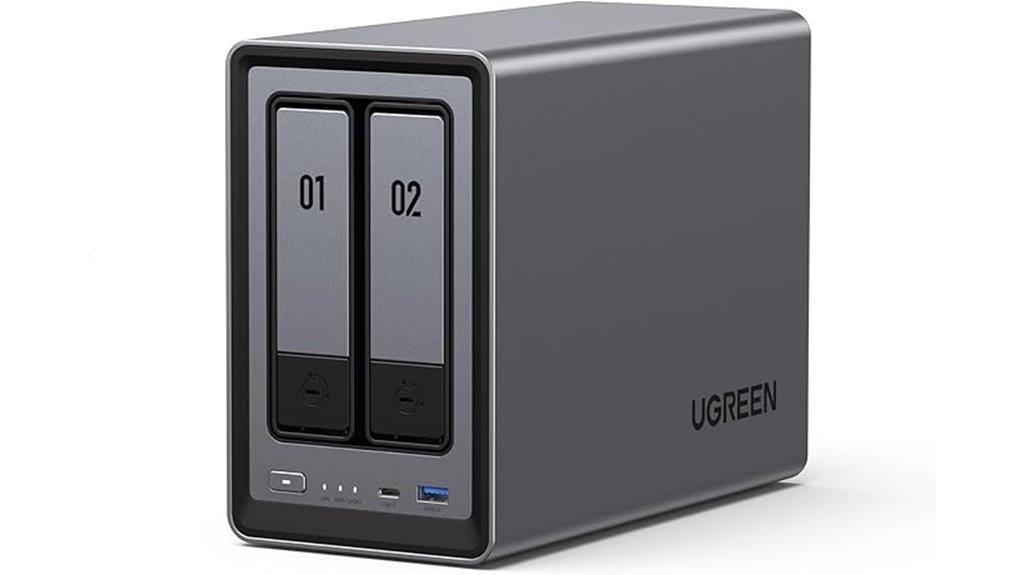
The UGREEN NASync DXP2800 2-Bay Desktop NAS stands out as an ideal choice for users seeking affordable, secure, and high-performance local storage. It offers massive capacity—up to 76TB—and supports third-party drives, making it perfect for backups, media, or photo libraries. Powered by a 12th Gen Intel N100 quad-core CPU and featuring a 2.5GbE port, it delivers fast transfers and smooth multitasking. Its user-friendly setup and compatibility across Windows, macOS, Android, and iOS simplify file sharing. Plus, with built-in AI features, encryption, and a 2-year warranty, it combines security, flexibility, and performance in one compact, diskless package.
Best For: users seeking an affordable, high-capacity, and secure local storage solution with easy setup and versatile device compatibility.
Pros:
- Supports up to 76TB capacity and third-party drives for flexible storage options
- Equipped with a powerful 12th Gen Intel N100 quad-core CPU and 2.5GbE port for fast data transfer and multitasking
- User-friendly setup with compatibility across Windows, macOS, Android, iOS, web browsers, and smart TVs, plus AI-powered organization features
Cons:
- Diskless configuration requires users to purchase compatible drives separately
- May lack some advanced enterprise features found in higher-end NAS systems
- Physical ports and expandability options are limited to two M.2 NVMe slots and a single 2.5GbE port
Synology 2-Bay DiskStation DS223j (Diskless)

For anyone seeking a secure and private cloud solution without the complexity of managing a large server, the Synology 2-Bay DiskStation DS223j (Diskless) stands out as an ideal choice. It provides complete data ownership, supporting multi-platform access from anywhere. You can easily share and sync files and media, making remote collaboration seamless. The device offers robust data protection by backing up media libraries and documents to various destinations. Plus, with a 2-year warranty and accessible support via Synology’s knowledge center and YouTube channel, it’s a reliable, user-friendly option for personal cloud needs.
Best For: individuals or small teams seeking a secure, private cloud storage solution with easy remote access and data management without the complexity of large servers.
Pros:
- Supports multi-platform access from anywhere for flexible data management
- Provides comprehensive data protection through versatile backup options
- Includes a 2-year warranty and accessible support resources for ease of use
Cons:
- Being diskless, it requires users to purchase and install compatible drives separately
- Limited to 2 drive bays, which may restrict storage capacity for larger needs
- May have a learning curve for users unfamiliar with network-attached storage systems
UGREEN NASync DXP4800 Plus 4-Bay Desktop NAS

The UGREEN NASync DXP4800 Plus stands out as an ideal choice for those who need reliable, high-speed data management in a compact desktop form. It features a 4-bay design with flexible RAID options, ensuring data redundancy and safety. Powered by an Intel Pentium Gold 8505 CPU and backed by 8GB DDR5 RAM, it delivers impressive performance, supporting up to 136TB of storage. Its dual network ports—10GbE and 2.5GbE—enable lightning-fast backups and remote access. With a user-friendly app, 4K HDMI output, and compatibility with third-party drives, this NAS makes managing and sharing your data seamless and secure.
Best For: small to medium-sized businesses or tech-savvy individuals seeking reliable, high-speed, and secure centralized data storage with versatile RAID options and remote access capabilities.
Pros:
- High-performance Intel Pentium Gold 8505 CPU with 8GB DDR5 RAM ensures smooth operation and fast data transfer speeds
- Supports up to 136TB storage with flexible RAID configurations for data redundancy and safety
- Features dual network ports (10GbE and 2.5GbE) for rapid backups and remote accessibility
Cons:
- Bulkier desktop design weighing nearly 14 pounds may require dedicated space
- Compatibility limited to certain third-party hard drives; not all drives may be supported
- Advanced features and setup may require technical knowledge for optimal use
Synology 2-Bay NAS DS223 (Diskless)
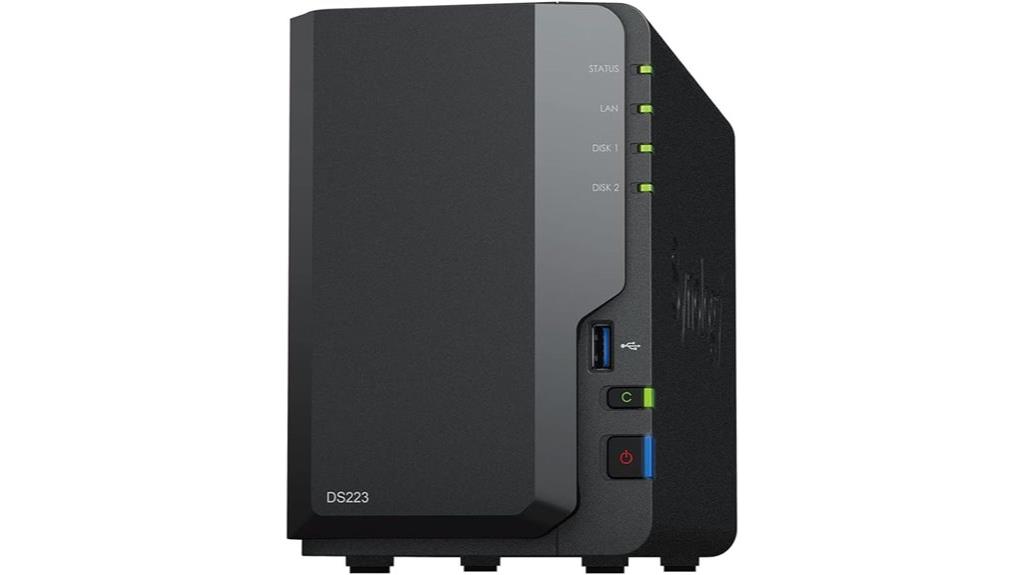
If you’re looking for a reliable and flexible personal cloud solution, the Synology 2-Bay NAS DS223 (Diskless) stands out as an excellent choice, especially since it supports multi-platform access and offers centralized data storage. With this device, you can consolidate your data securely under your own ownership, making file sharing and synchronization straightforward. It’s ideal for backing up media libraries and important documents, supporting various backup destinations. Plus, it features intelligent surveillance tools for home security and a two-year warranty, providing peace of mind. Overall, the DS223 combines versatility, security, and ease of use for personal or small business needs.
Best For: individuals and small businesses seeking a reliable, secure, and easy-to-manage personal cloud storage solution with multi-platform access.
Pros:
- Supports multi-platform access, making it easy to share and synchronize data across devices
- Offers centralized data storage with full ownership, enhancing security and control
- Includes intelligent surveillance features for home security and a two-year warranty for peace of mind
Cons:
- Diskless model requires purchasing compatible hard drives separately
- May have a learning curve for users unfamiliar with NAS systems
- Limited to two drive bays, which could restrict storage expansion for growing needs
Seagate Recertified 12TB IronWolf NAS Hard Drive
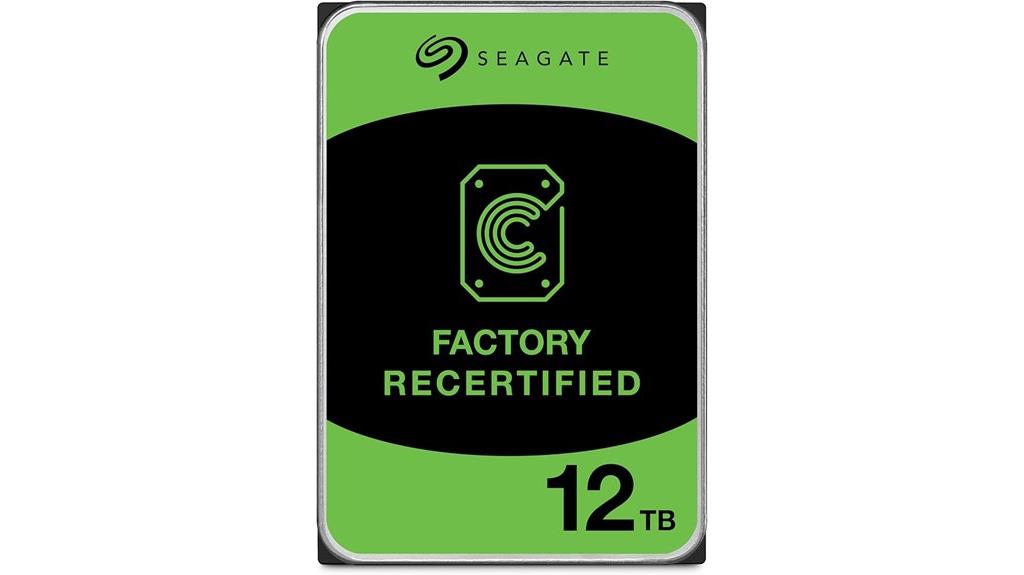
The Seagate Recertified 12TB IronWolf NAS Hard Drive stands out as a reliable choice for home and small business users seeking robust storage solutions. Designed for NAS servers and personal cloud setups, it’s compatible with 1- to 8-bay enclosures and supports PC operating systems. With a 7200 RPM speed and transfer rates up to 214MB/s, it offers fast, consistent performance. Equipped with AgileArray technology and IronWolf Health Management, it ensures durability and reliability over time. At just over 1.5 pounds, it’s a compact, efficient option for expanding your data storage securely and easily in 2025.
Best For: home and small business users seeking a reliable, high-capacity NAS hard drive for data storage and backup.
Pros:
- Supports NAS environments with compatibility for 1- to 8-bay enclosures
- Fast rotational speed of 7200 RPM and transfer rates up to 214MB/s for efficient performance
- Equipped with AgileArray technology and IronWolf Health Management for durability and drive longevity
Cons:
- Recertified product may have minor cosmetic imperfections or previous usage marks
- Interface details are unspecified, which could impact compatibility with certain systems
- Heavier weight of 1.55 pounds may require sturdy mounting solutions in some setups
Youyeetoo CM3588 Plus Mini NAS Platform with 8K Video and 32GB RAM

For media professionals and tech enthusiasts seeking a compact yet powerful storage solution, the Youyeetoo CM3588 Plus Mini NAS Platform stands out with its ability to handle 8K video processing and high-speed data transfer. Powered by the Rockchip RK3588 octa-core processor and equipped with 32GB LPDDR5 RAM, it delivers robust performance for demanding tasks. Its four NVMe M.2 slots support extensive storage expansion, with transfer speeds up to 1 GB/sec. The device features dual HDMI outputs, 8K video decoding, and recording capabilities, making it ideal for high-resolution media projects. Pre-installed with OpenMediaVault, it’s versatile for home, small business, or media professional use.
Best For: media professionals and tech enthusiasts seeking a compact yet powerful storage solution capable of handling 8K video processing and high-speed data transfer.
Pros:
- Robust performance with Rockchip RK3588 octa-core processor and 32GB LPDDR5 RAM.
- Supports extensive storage expansion with four NVMe M.2 PCIe 3.0 slots and high-speed transfer speeds up to 1 GB/sec.
- Capable of 8K video decoding, playback, and 4K60p recording, ideal for demanding multimedia tasks.
Cons:
- May require technical knowledge for setup and configuration due to diverse OS compatibility.
- Limited to small business or home environments; not designed for large-scale enterprise use.
- Physical design, while durable, may lack advanced cooling solutions for prolonged intensive processing.
Beelink Me Mini Mini PC NAS with Intel N150, 12GB LPDDR5, 64GB eMMC, 6 M.2 SSD Slots, Dual 2.5G LAN/WiFi6/BT5.2/USB3.2/HDMI
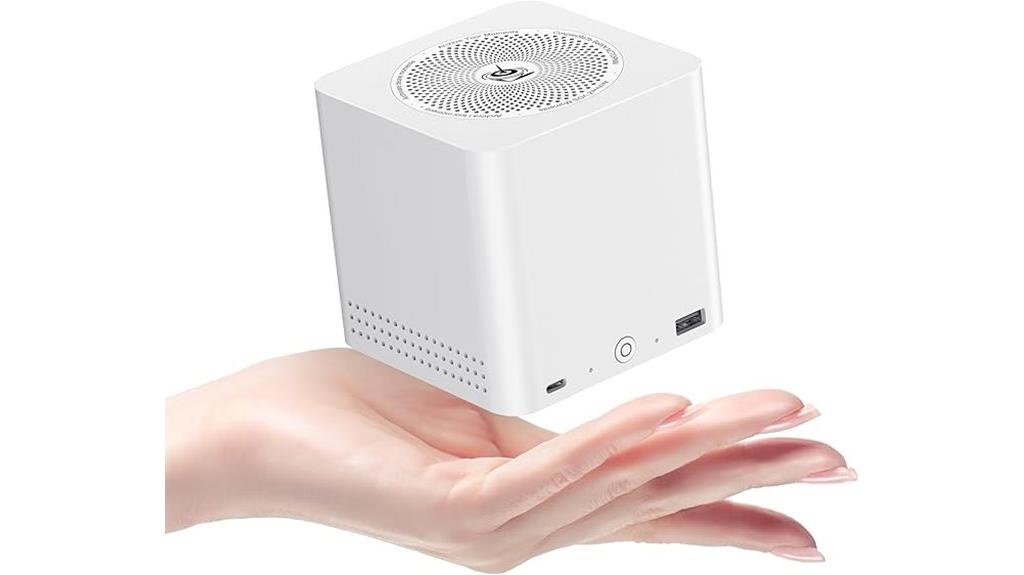
Designed for home users seeking a powerful yet compact media and storage hub, the Beelink Me Mini Mini PC NAS stands out with its impressive networking capabilities and versatile performance. Equipped with an Intel N150 CPU, 12GB LPDDR5 RAM, and 64GB eMMC storage, it supports six M.2 SSD slots for expandable storage up to 24TB. Dual 2.5G LAN ports, WiFi 6, and Bluetooth 5.2 enable fast, reliable connectivity. Its small form factor, quiet operation, and multiple I/O options make it ideal for media streaming, private cloud, or NAS setups. This mini PC combines power, expandability, and efficiency, perfect for those wanting a flexible, space-saving personal cloud solution.
Best For: home users and small offices seeking a compact, powerful media center, private cloud, or NAS with versatile connectivity and expandable storage.
Pros:
- Supports up to 24TB of expandable storage via six M.2 SSD slots, ideal for large media libraries and data backups.
- Fast networking with dual 2.5G LAN, WiFi 6, and Bluetooth 5.2 ensures reliable, high-speed connectivity.
- Compact, quiet design with silent cooling makes it suitable for living spaces and home offices.
Cons:
- Limited pre-installed storage (64GB eMMC) may require additional drives for extensive data needs.
- The compact size might limit upgrade options beyond storage expansion.
- Depending on use, the Intel N150 CPU may be less powerful compared to higher-end processors for intensive tasks.
Gigastone 2TB NAS SSD for Home Server and Data Storage
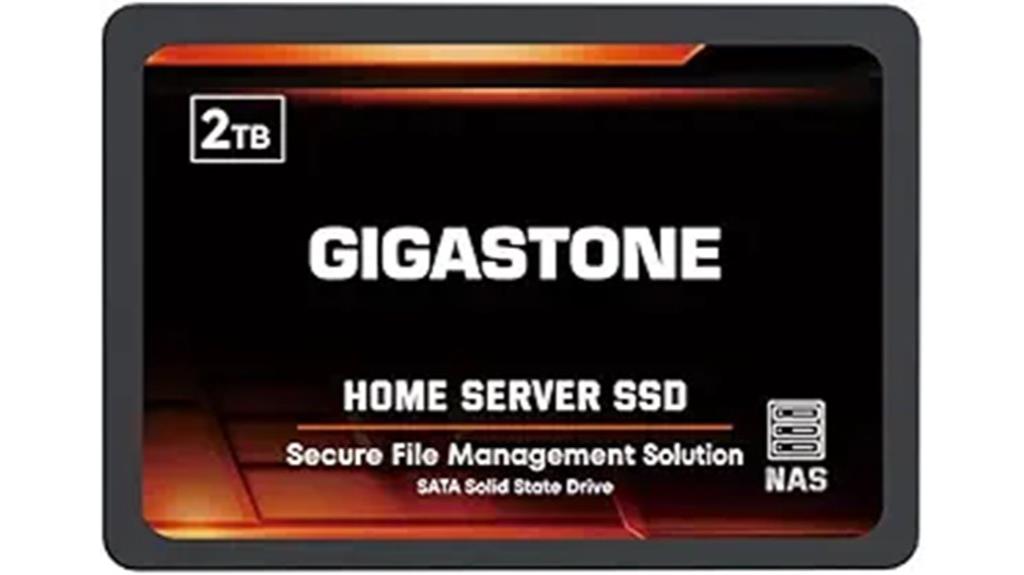
If you’re looking to build a reliable home server or expand your data storage, the Gigastone 2TB NAS SSD stands out with its high durability and fast transfer speeds. Designed for 24/7 operation, it features advanced TLC 3D NAND and SLC cache, offering transfer speeds up to 550 MB/s. This rugged drive is compatible with NAS systems, RAID setups, and devices like PCs, laptops, and gaming consoles. It’s ideal for heavy workloads such as 4K video editing, virtualization, and database storage. With a compact, lightweight design, it’s easy to install and provides reliable performance, making it a versatile choice for your personal cloud setup.
Best For: users seeking a reliable, high-performance SSD for home servers, NAS setups, gaming, or intensive data tasks like 4K editing and virtualization.
Pros:
- High durability and reliable 24/7 operation suitable for demanding workloads
- Fast transfer speeds up to 550 MB/s for quick data access and transfer
- Compatible with various devices including NAS systems, PCs, laptops, and gaming consoles
Cons:
- Requires proper formatting (GPT or MBR) before use to avoid setup issues
- Slightly higher price point compared to some consumer-grade SSDs
- Limited to 2TB capacity, which may not suit users needing larger storage options
Beelink ME Mini PC, Desktop NAS with Intel N150, 12G RAM, 64G EMMC, 2TB M.2 SSD, Dual 2.5G LAN

The Beelink ME Mini PC stands out as an excellent choice for those seeking a compact yet powerful personal cloud server, thanks to its extensive storage capabilities and versatile connectivity options. It features six M.2 NVMe SSD slots supporting up to 24TB total storage, enough for thousands of movies and millions of files. Powered by an Intel N150 CPU, 12GB RAM, and 64GB eMMC, it supports various OSes like UNRAID and TrueNAS. Dual 2.5G LAN ensures fast network speeds, while built-in WiFi 6 and Bluetooth 5.2 provide wireless convenience. Its quiet operation and robust support make it ideal for home media and data sharing.
Best For: home users and small office setups seeking a compact, high-capacity, and versatile NAS or media server with fast networking and expandability.
Pros:
- Supports up to 24TB of storage across six M.2 NVMe SSD slots, ideal for large media libraries and data backups
- Dual 2.5G LAN and WiFi 6 for high-speed network connectivity and seamless wireless access
- Quiet operation with efficient cooling and low noise levels, suitable for home environments
Cons:
- Limited to a maximum of 4TB per SSD slot, which may require additional drives for very large storage needs
- Slightly higher power consumption due to multiple SSD slots and cooling system
- May require technical knowledge for system setup and OS configuration for advanced NAS functionalities
Gigastone 2TB NAS SSD Drive (4-Pack)
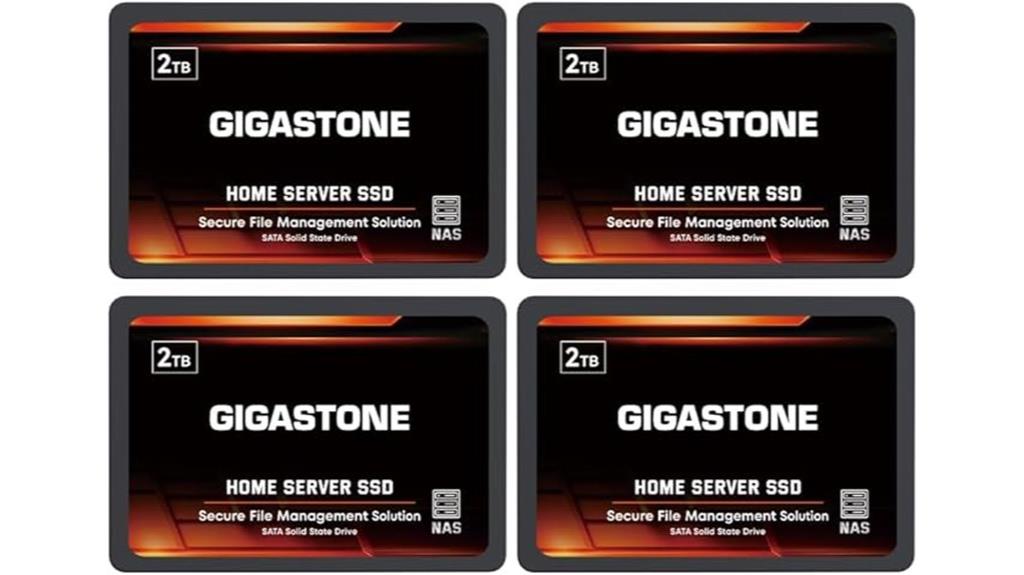
For those building a personal cloud or NAS setup that demands reliable, high-speed storage, the Gigastone 2TB NAS SSD Drive (4-Pack) offers an excellent solution. These 2.5″ SATA SSDs provide high capacity and durability, supporting RAID configurations for flexible data management. With TLC 3D NAND technology and SLC cache, they deliver speeds up to 550 MB/s, perfect for intensive tasks like 4K editing or virtualization. Built for continuous operation, they feature data protection, power loss safeguards, and ECC for reliability. Compatible with major NAS brands like Synology and QNAP, this pack ensures secure, seamless data access with a long lifespan and a 3-year warranty.
Best For: users seeking reliable, high-capacity SSDs for personal cloud, NAS, or server environments, especially for intensive tasks like 4K editing and virtualization.
Pros:
- High-speed transfer rates up to 550 MB/s suitable for demanding applications
- Durable design with high endurance, data protection, and power loss safeguards
- Compatible with major NAS brands and supports RAID configurations for flexible data management
Cons:
- Only available in 2.5″ SATA form factor, limiting usage options outside compatible systems
- Requires proper configuration and setup for RAID to maximize performance benefits
- The 3-year warranty, while standard, may be less extensive compared to enterprise-grade solutions
Gigastone 2-Pack Home Server SSDs (2TB) for NAS and Data Storage

Gigastone’s 2-Pack Home Server SSDs (2TB) stand out as an ideal choice for users who need reliable, high-performance storage for NAS systems and personal cloud setups. Designed for compatibility with major NAS brands like Synology, QNAP, and Asustor, these SSDs deliver fast transfer speeds up to 550 MB/s with TLC 3D NAND technology. Built for heavy workloads, they support virtualization, 4K/8K editing, and database tasks, while ensuring durability with power loss protection and ECC. The 2-pack offers great value, backed by a 3-year warranty and lifetime free support, making them perfect for secure, consistent data access at home or in the office.
Best For: users seeking reliable, high-performance SSD storage for NAS systems, personal cloud, and demanding workloads like video editing and virtualization.
Pros:
- High transfer speeds up to 550 MB/s ensure efficient data access and transfer
- Compatible with major NAS brands such as Synology, QNAP, and Asustor
- Durable design with power loss protection, ECC, and a 3-year warranty for long-term reliability
Cons:
- Limited to SATA III interface, which may be slower than NVMe options for some use cases
- Slightly larger dimensions for a 2.5-inch drive may require compatibility checks in some setups
- Customer reviews average 4.2 stars, indicating some users may encounter issues or have minor concerns
Factors to Consider When Choosing Personal Cloud Servers
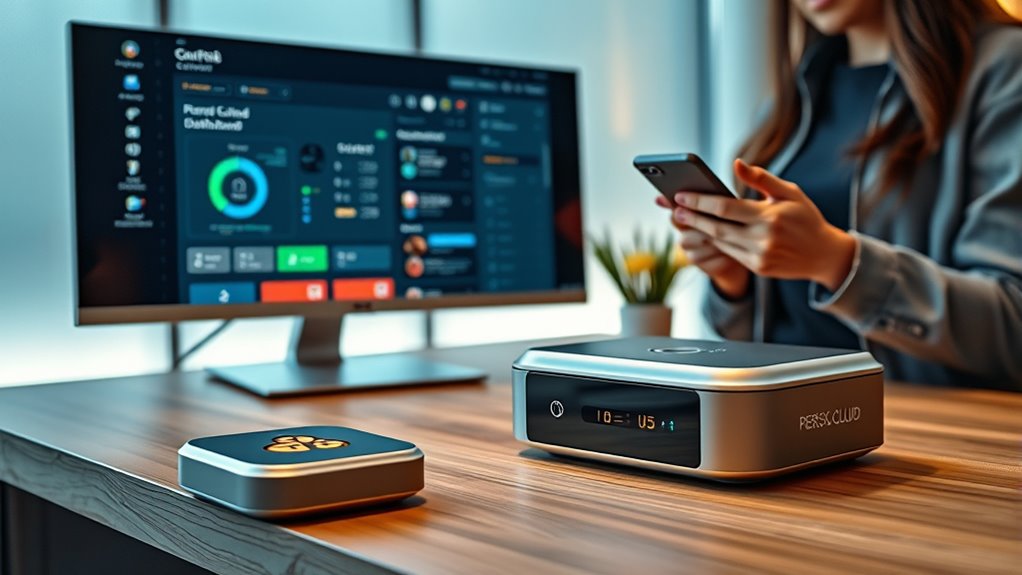
When selecting a personal cloud server, I look at my storage needs, security features, and how well it integrates with my devices. I also consider how easy it is to back up data and recover files if something goes wrong. Understanding these factors helps me choose a reliable and user-friendly option that fits my lifestyle.
Storage Capacity Needs
Understanding your current and future data storage needs is vital when selecting a personal cloud server. I recommend evaluating how much space your files, backups, and media libraries require now and anticipate needing in the coming years. For example, 4K videos and high-resolution photos demand several terabytes of storage. Keep in mind that RAID configurations, like RAID 1, can reduce available capacity because they prioritize redundancy. As your data grows, expanding capacity with additional drives or external storage options becomes essential. Knowing your data growth rate helps in choosing a server with enough headroom to avoid frequent upgrades. By accurately estimating your storage needs, you guarantee your cloud setup remains efficient and scalable, supporting your digital life now and in the future.
Data Security Features
Choosing the right personal cloud server involves more than just evaluating storage capacity; security features are equally vital. I look for robust encryption protocols like SSL/TLS to protect data during transfer. RAID configurations are necessary for data redundancy, preventing loss if a drive fails. Built-in access controls and user authentication keep sensitive information safe from unauthorized access. Power loss protection and ECC memory help maintain data integrity during outages or hardware errors. Additionally, regular firmware updates and security patches are essential—they address vulnerabilities and keep the server secure from emerging threats. These features collectively ensure my data remains private, protected, and accessible only to authorized users. Prioritizing security isn’t optional; it’s fundamental to choosing a reliable personal cloud server.
Compatibility With Devices
Selecting a personal cloud server that seamlessly works with your devices requires careful attention to compatibility factors. First, I check if it supports multiple operating systems like Windows, macOS, iOS, and Android, guaranteeing smooth integration across all my devices. I also verify that it’s compatible with my hardware interfaces, such as USB, Ethernet, SATA, or NVMe ports, so I can connect my existing hardware easily. It’s important to see if the server supports popular media and file-sharing protocols like DLNA, Plex, SMB, or AFP, for versatile streaming and sharing. If I use smart home devices, I confirm the server’s compatibility with automation platforms. Lastly, I ensure it offers remote access options through apps or web portals, making management simple wherever I am.
Backup and Recovery
When evaluating personal cloud servers, it’s essential to guarantee they support automated backup options for multiple devices, so my data stays safe without manual effort. I look for servers that offer easy recovery features like snapshots or version history, allowing me to restore previous data states quickly. Supporting multiple backup destinations—local drives and remote/cloud services—ensures thorough data protection. I also prioritize servers with user-friendly restore procedures, making recovery straightforward even after accidental deletion or corruption. Additionally, RAID support and error correction capabilities are crucial, as they boost data integrity and resilience against hardware failures. These features collectively provide peace of mind, knowing my data is protected, recoverable, and secure against unforeseen issues.
Ease of Use
Ensuring my personal cloud server is easy to use makes managing and accessing my data much more straightforward. A user-friendly interface with simple setup procedures allows me to get started quickly without technical frustration. Clear documentation and intuitive navigation help me understand how to manage my storage and troubleshoot issues easily. Automated backup and synchronization features save me time and effort, ensuring my data stays current without manual intervention. Compatibility with common operating systems and devices means I can access and share files seamlessly across my laptop, tablet, or smartphone. Features like one-click installation of media servers or apps make expanding my cloud’s functionality effortless, avoiding complex configurations. Overall, ease of use enhances my experience and keeps my data accessible and manageable at all times.
Budget Considerations
Budget considerations play a vital role in choosing the right personal cloud server because costs can vary widely, from affordable options around $100 to high-end models over $1,000. Setting a clear budget helps narrow your options and focus on models that meet your needs without overspending. It’s important to take into account the total cost of ownership, including initial purchase, subscription fees, and ongoing maintenance or support. Cheaper models might have limited storage, slower transfer speeds, or fewer features, which could impact long-term value. Investing a bit more in a server with better hardware can offer greater scalability and durability, saving money on future upgrades. Balancing your budget with desired performance, security, and expandability ensures you choose a personal cloud server that fits both your needs and your wallet.
Frequently Asked Questions
How Secure Are Personal Cloud Servers Against Cyber Threats?
Personal cloud servers can be quite secure if I take the right precautions. I make sure to use strong, unique passwords and enable two-factor authentication. Regular software updates and encryption add extra layers of protection. While no system is completely invulnerable, being vigilant and practicing good security habits helps me safeguard my data against cyber threats effectively. It’s all about staying proactive and informed.
Can Personal Cloud Servers Support Remote Access From Multiple Devices?
Think of a personal cloud server as a digital keyring, opening your data from anywhere. Yes, it supports remote access from multiple devices seamlessly. I’ve experienced this myself—whether on my laptop, tablet, or phone, I can effortlessly reach my files. The key is proper setup and security measures, ensuring I stay connected without risking my data. It’s like carrying a portable, secure vault wherever I go.
What Are the Energy Consumption Implications of Running a Personal Cloud Server?
Running a personal cloud server does consume energy, but it’s usually manageable. I’ve found that modern devices are more energy-efficient, so my server doesn’t spike my electricity bills. It’s worth considering the power consumption specs before setting one up, especially if you plan to keep it running 24/7. Overall, while there’s some energy use involved, the convenience and security of having your data accessible outweighs the minimal extra power consumption.
How Easy Is It to Upgrade or Expand Storage on These Servers?
Upgrading or expanding storage on personal cloud servers is usually straightforward, especially with models that feature modular drives or easy-access bays. I find that most modern servers let you swap out or add drives without much hassle, often with hot-swappable options. Just make sure to check compatibility and your server’s specifications beforehand. Overall, expanding storage is often as simple as installing new drives and updating your system settings.
Do Personal Cloud Servers Require Technical Expertise for Setup?
No, personal cloud servers don’t usually require extensive technical expertise for setup. I find most models come with user-friendly interfaces and step-by-step guides, making installation straightforward. If you’re comfortable with basic network setup, you’ll be able to get it running quickly. Some advanced features might need a bit more knowledge, but overall, these servers are designed for ease of use, even for beginners.
Conclusion
Choosing the right personal cloud server can transform how you access and protect your data. Did you know that over 60% of data breaches happen due to poor data security? With options like the Synology DiskStation or Beelink Mini PC, you can stay secure and connected effortlessly. Investing in a reliable personal cloud means peace of mind and seamless access—making your digital life simpler and safer in 2025.




